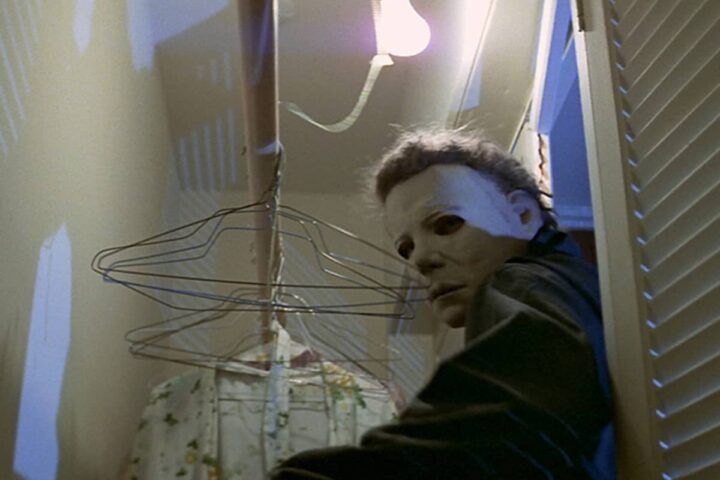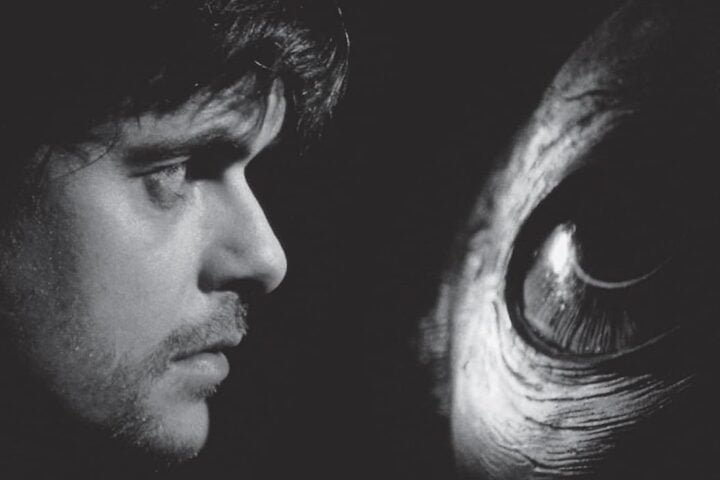Anyone who’s passed the endurance test that is Sátántangó, Béla Tarr’s 450-minute epic that represents in slow-crawl detail the disintegration of a Hungarian farm community, may expect his other work to be less weighty. But, then, those viewers probably haven’t seen his existentialist nightmare Werckmeister Harmonies, whose phantasmagoria includes the dramatization of a solar eclipse by a holy fool among the boozy all-nighters at the local bar, a mummified whale that stands in as a vast allegorical leviathan, and a mob of peasants that gathers in the town square to build bonfires and stoke their resentment before laying siege upon a ramshackle hospital. For all the talk of Tarr’s best work moving at the speed of a glacier, tremendous social unrest leads to apocalyptic upheavals within the worlds of Sátántangó and Werckmeister Harmonies.
Still, those familiar with Tarr’s work may be surprised by the comparatively small scale of 1988’s Damnation. Imagine a love triangle where a worker (the strong silent type) in a mining town falls desperately in love with an unhappily married cabaret singer (the femme fatale) who dreams of a life in the big city. He schemes her husband out of the picture by involving him with some corrupt smugglers, and indulges in an extramarital affair with her where he promises her that if she wants the moon, she can have it. This unhappy little tale ends badly for everyone, since they’re ultimately ignorant peasants trapped in a life of quiet desperation. Damnation is devoted to noir tropes but stretches each familiar-seeming moment into a long-running, slow-moving, somnambulistic shot that will be familiar to Tarr’s fans.
Those new to Tarr’s “cinema of patience,” as Chicago-based distributor Facets Video puts it, shouldn’t start with Damnation and are advised to heed this advice: Watch some of his other films first, preferably Werckmeister Harmonies. Viewers are well advised to consider that the famous opening shot of Sátántangó is a crawling 10-minute depiction of cows emerging from a barn and stupidly wandering through the rain and mud, and that shot is very active in comparison to the drawn-out beginning of Damnation, wherein mining cable cars, glimpsed from an open window, cary minerals back and forth in the distance.
Eventually, it’s revealed that we’re witnessing the point of view of the worker, Karrer (Miklós Székely B.), from his spare and lonely apartment. Then we see him shaving his coarse, rough-hewn face, a tough-looking mug. This time, the camera hardly wavers, and we’re stuck on Karrer and the slow, scraping sound of the razor going up and down, up and down. If you haven’t figured it out by now, things move very slowly and repetitively here, and as a spectator you’ll be as longing for escape from the mundane, boring routine as Karrer is.
Escape is found in the club, where patrons sit glazed over thick mugs of beer as the singer (Vali Kerekes) is slumped over a stool, hanging onto the microphone as though she might fall over otherwise, muttering in a seemingly half-asleep way through a despondent love song about how there’s really not much chance of finding love, and the need for the hopeless to dream of Shangri-La. Though it might seem like a dead crawl of a musical number, we’re so inured to a world where so little transpires, even a mild thread of hope gets you to perk up your ears, and respond as Karrer does to the thought that she could bring him a small shread of happiness. The black-and-white photography by Gábor Medvigy is purposefully leaden and oppressive like the world of the film, all never-ending rain, muddy streets, cramped houses, wandering mongrel dogs, and half-empty packs of cigarettes. Indeed, this world is so bleak and overwhelming that even a half-hearted pop song feels like good medicine.
Tarr’s gaze is heroically unblinking, but when his films achieve brilliance, it’s because he places within their world something loaded with mercurial power. The hero of Werckmeister Harmonies is commonly referred to as a holy fool, but is in fact an articulate philosopher with a sense of poetry and a flair for drawing out members of the community with his cosmic passions. He has dreams and visions, which are gradually snuffed out by the forceful pessimism of Tarr’s cinematic space, his representation of peasant class rage being kindled by baroque mysticism. By contrast, the characters in Damnation simply move toward their grim fates as if they were no smarter, no more audacious in their choices, than the lumbering cows of Sátántangó. Damnation’s people, in a sense, are like animals, beginning their day as it ends, trapped inside their cages. Tarr’s fascination with their ennui is profound, and while his statement about them isn’t lacking in visual power and philosophical heft, it’s also questionable whether it’s the strongest statement an artist of his caliber can make.
Image/Sound
After spending over a decade resisting the productions of DCPs for the theatrical distribution of his work, Béla Tarr finally agreed to grant Arbelos Films the privilege of doing so, and the fruits of that labor can be experienced in full glory on this 4K Blu-ray release of Damnation. The lush play of light and shadow in the film’s 35mm images is preserved quite convincingly here, along with the depth of detail, though at times the grain feels a bit chunky and overpronounced. Still, seen on a large television, this is a gorgeous and overwhelming visual experience, certainly vastly superior to the low-resolution Facets DVD from way back in 2006. Tinniness on the prior edition is also alleviated here, as the soundtrack attains a new expansiveness. Voices and footsteps reverberate in the film’s depopulated open spaces and Mihály Víg’s spooky cabaret jazz is both luxuriously bassy and sufficiently bright.
Extras
Those familiar with Tarr’s cinema may also know how tight-lipped he is about his work, so the video interview included in the supplements, which finds him brushing off analytical praise of Damnation and grumbling about his skepticism toward the digital revolution, will be par for the course. Further light on the filmmaking process is shed in the Q&As conducted with Víg and actor Miklós Székely, both of whom are generous with anecdotes from the production. Among the more interesting nuggets: Székely’s claim that Ágnes Hranitzky, Tarr’s spouse and editor, is the more demanding judge of authenticity on the set of their films, and Víg’s recollection of calling Tarr out on his ignorance of a certain synthesizer’s capabilities.
Providing additional context to the film is a pair of 1950s newsreels from the Oroszlány and Dorog coal mines, the sites of Damnation’s location shooting. Featuring voiceovers celebrating the mines’ efforts to “ensure the economic circulation of the country” and set to triumphant orchestral music, the reels capture a stark contrast to the bleak late-communist reality visualized in the film. The disc is rounded out by Arbelos’s trailer for the 4K restoration and a fine essay in the liner notes by Cinema Scope and Film Comment contributor Jay Kuehner.
Overall
A turning point in his magisterial filmography, Béla Tarr’s doom-laden noir is treated to a long-awaited 4K restoration of exquisite clarity by Arbelos Films.
Since 2001, we've brought you uncompromising, candid takes on the world of film, music, television, video games, theater, and more. Independently owned and operated publications like Slant have been hit hard in recent years, but we’re committed to keeping our content free and accessible—meaning no paywalls or fees.
If you like what we do, please consider subscribing to our Patreon or making a donation.



